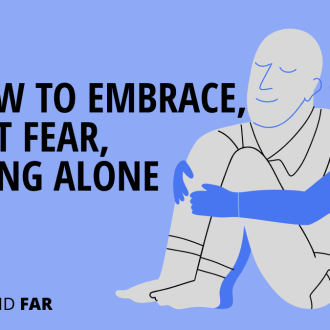
9 Best Articles on Well Being
The most useful articles on well-being from around the web, curated by thought leaders and our community.
Refind focuses on timeless pieces and updates the list whenever new, must-read articles or videos are discovered.
Top 5 Well Being Articles
At a glance: these are the articles that have been most read, shared, and saved on well-being by Refind users in 2024 so far.
Videos
Watch a video to get a quick overview.
Nicola Sturgeon: Why governments should prioritize well-being
In 2018, Scotland, Iceland and New Zealand established the network of Wellbeing Economy Governments to challenge the acceptance of GDP as the ultimate measure of a country's success. In this visionary…
How to ...?
How to Embrace, Not Fear, Being Alone
Are you afraid of being alone? Well, you’re not alone in that. In a 2014 survey of 2,000 adults, one in three said they fear being alone: 40% of women and 35% of men. Ironically, the more we subvert…
«the capacity to be alone probably makes your interactions with others richer. Because you’re bringing to the relationship a person who’s actually got stuff going on inside and isn’t just a connector circuit that only thrives off of others.»
How to measure meaning in life
Meaningfulness is associated with greater well-being, and scientists have even devised ways to measure meaning in life.
«However, one of the strongest predictors of how meaningful people perceive their lives to be is… Being reminded of valued sources of meaning.»
Short Articles
Short on time? Check out these useful short articles on well-being—all under 10 minutes.
What To Do When You're Tired of Being Tired
In our first session this year, my coaching client Jane told me that she has rested, given herself permission to feel down, and lowered her personal bar, just as we all have been advised to do as we…
«A mantra I use in my own life is, “This is what’s happening right now. I’m doing the best that I can. Just get going, and see what happens.”»
The Rule of Compounding: Why Small Steps Lead to Big Gains
What Warren Buffet's $300,000 haircut can teach us about success, compounding, and sustainable well-being. Consistency is the key.
«the law of compounding gains, which goes something like this: small investments made consistently over time build upon themselves and, eventually, amount to something big.»
If You Want Success, Pursue Happiness
Many people chase achievement, assuming it will lead to well-being. They should reverse that order of operations.
«The first thing to remember is that happiness requires balance. No matter how much you enjoy your work, overwork will become an obstruction to well-being.»
To Be Happier at Work, Think Flexibly about Your Job—and Yourself
In a new paper, Yale SOM’s Amy Wrzesniewski and her co-authors find that well-being can be enhanced by pairing a shift in your job mindset with changes in how you think about your own strengths and…
Income and emotional well-being: A conflict resolved
Shared by 267, including Uta Frith, Paul Graham, Paul Kedrosky
Long Articles
These are some of the most-read long-form articles on well-being.
The power of short breaks, movement and other practices on improving mental health
Researchers suggest it is important to build daily habits that support mental well-being and seek care when necessary.
«Though it may not always feel plausible or even comfortable, slowing down and allowing yourself a dedicated moment of rest can do wonders for mental well-being, especially when speed and efficiency seem to have become integral to our lives.»
What is Refind?
Every day Refind picks the most relevant links from around the web for you. Picking only a handful of links means focusing on what’s relevant and useful.
How does Refind curate?
It’s a mix of human and algorithmic curation, following a number of steps:
- We monitor 10k+ sources and 1k+ thought leaders on hundreds of topics—publications, blogs, news sites, newsletters, Substack, Medium, Twitter, etc.
- In addition, our users save links from around the web using our Save buttons and our extensions.
- Our algorithm processes 100k+ new links every day and uses external signals to find the most relevant ones, focusing on timeless pieces.
- Our community of active users gets the most relevant links every day, tailored to their interests. They provide feedback via implicit and explicit signals: open, read, listen, share, mark as read, read later, «More/less like this», etc.
- Our algorithm uses these internal signals to refine the selection.
- In addition, we have expert curators who manually curate niche topics.
The result: lists of the best and most useful articles on hundreds of topics.
How does Refind detect «timeless» pieces?
We focus on pieces with long shelf-lives—not news. We determine «timelessness» via a number of metrics, for example, the consumption pattern of links over time.
How many sources does Refind monitor?
We monitor 10k+ content sources on hundreds of topics—publications, blogs, news sites, newsletters, Substack, Medium, Twitter, etc.
Can I submit a link?
Indirectly, by using Refind and saving links from outside (e.g., via our extensions).
How can I report a problem?
When you’re logged-in, you can flag any link via the «More» (...) menu. You can also report problems via email to hello@refind.com
Who uses Refind?
450k+ smart people start their day with Refind. To learn something new. To get inspired. To move forward. Our apps have a 4.9/5 rating.
Is Refind free?
Yes, it’s free!
How can I sign up?
Head over to our homepage and sign up by email or with your Twitter or Google account.
Keep Learning
Get the big picture on your favorite topics.








